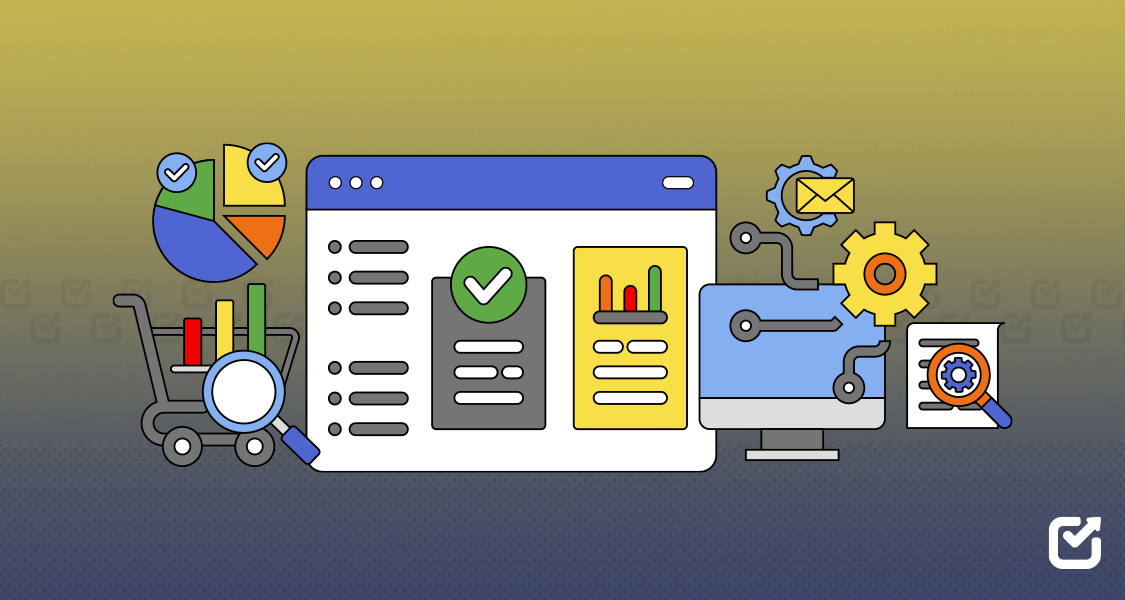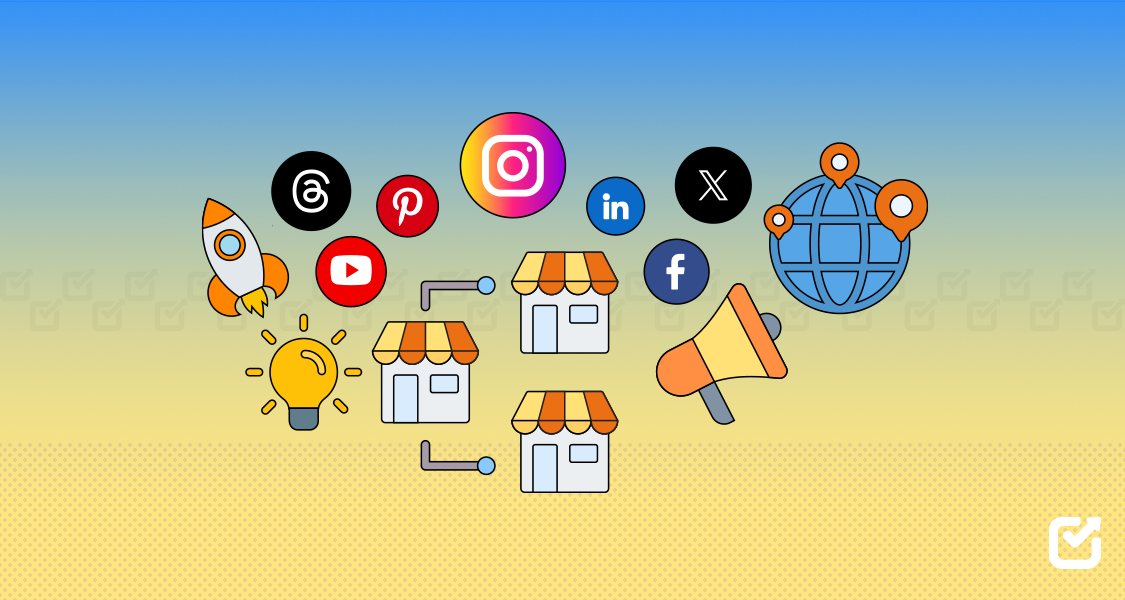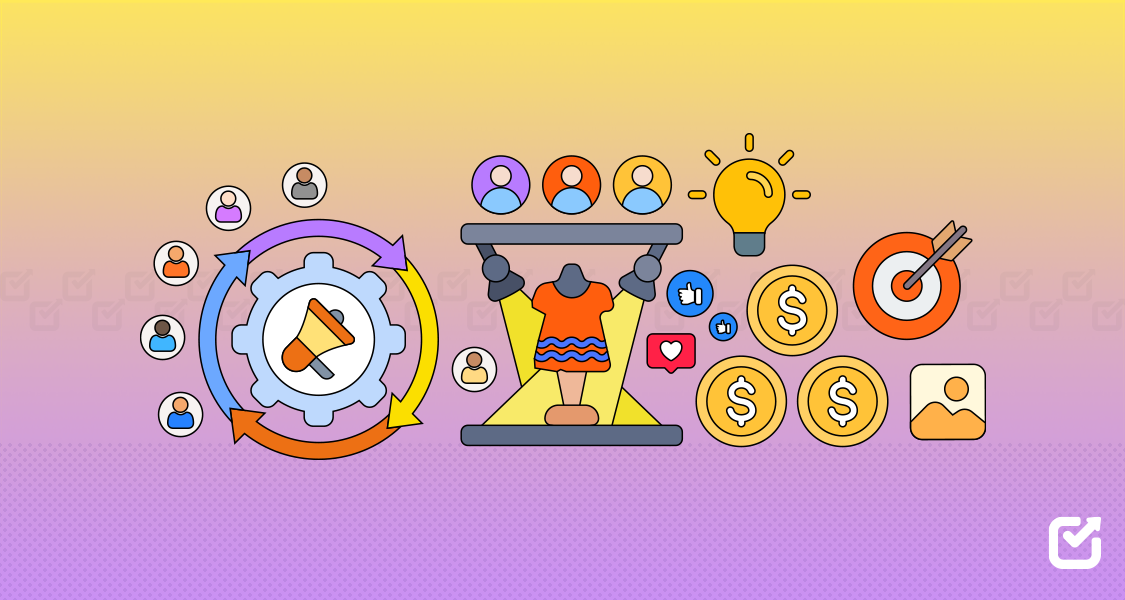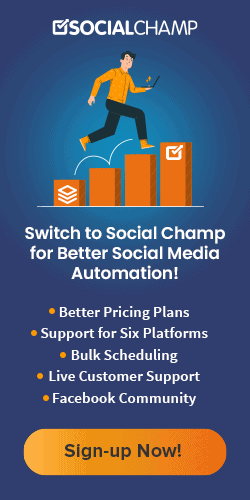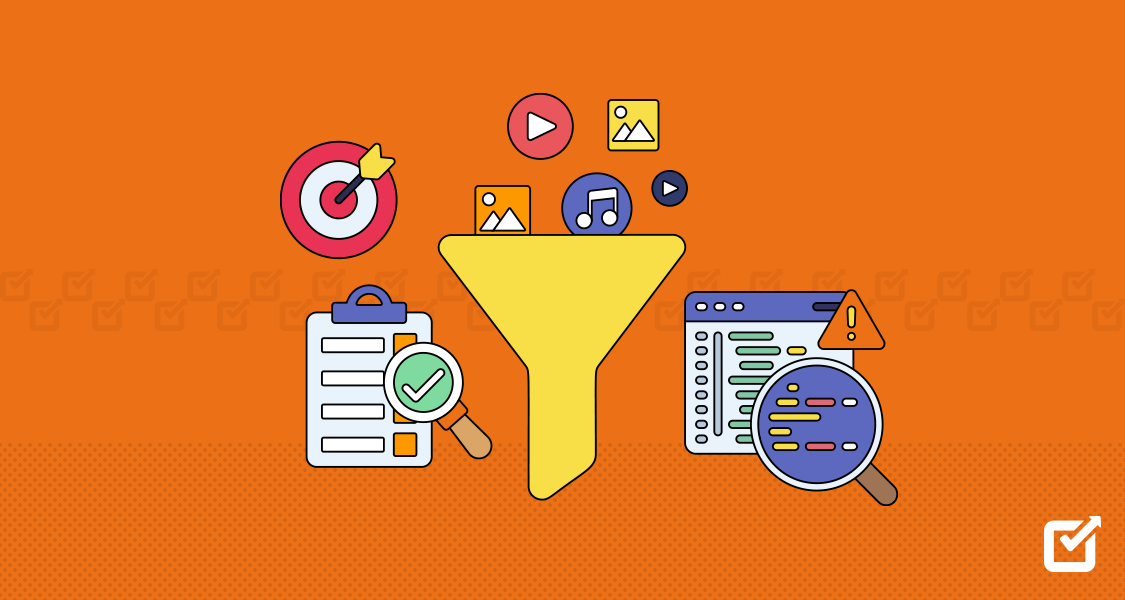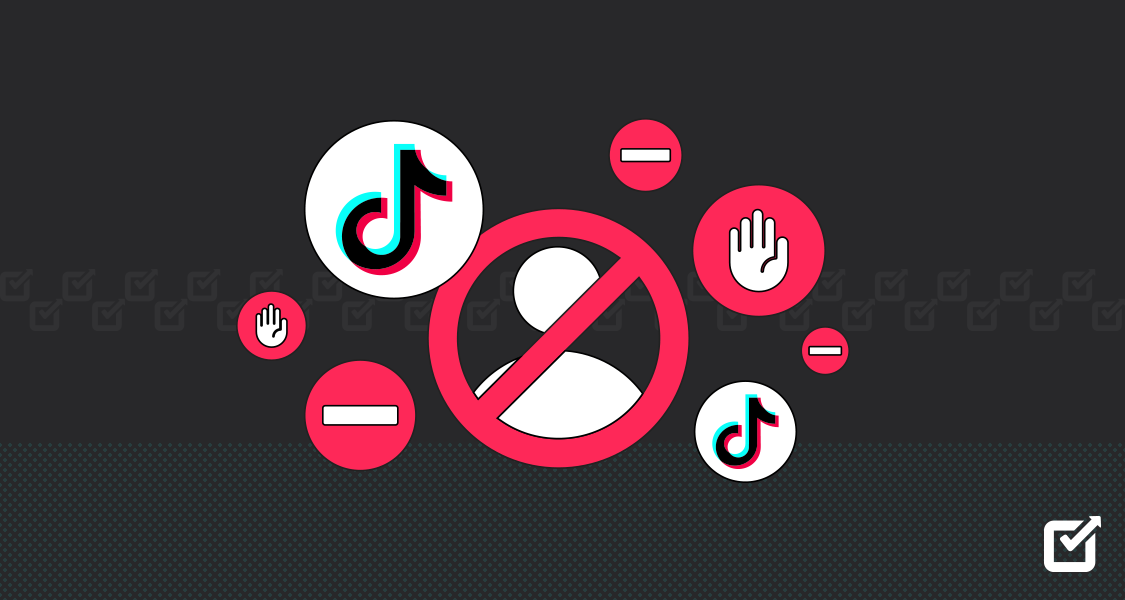You wake up, grab your phone, and within seconds, you’re scrolling through personalized offers from your favorite brands.
A few taps later, your order is placed—no friction, no hassle.
Now, imagine if your retail business could create the same seamless experience for your customers.
With competition at an all-time high, relying on traditional marketing methods just doesn’t cut it anymore.
Retail marketing automation is transforming how businesses attract, engage, and convert customers.
From AI-driven personalization to automated social media scheduling, the right strategies can boost sales while saving you hours of manual work.
In this blog, you’ll discover the latest trends, social media tools, must-know strategies, and top tools to streamline your marketing efforts.
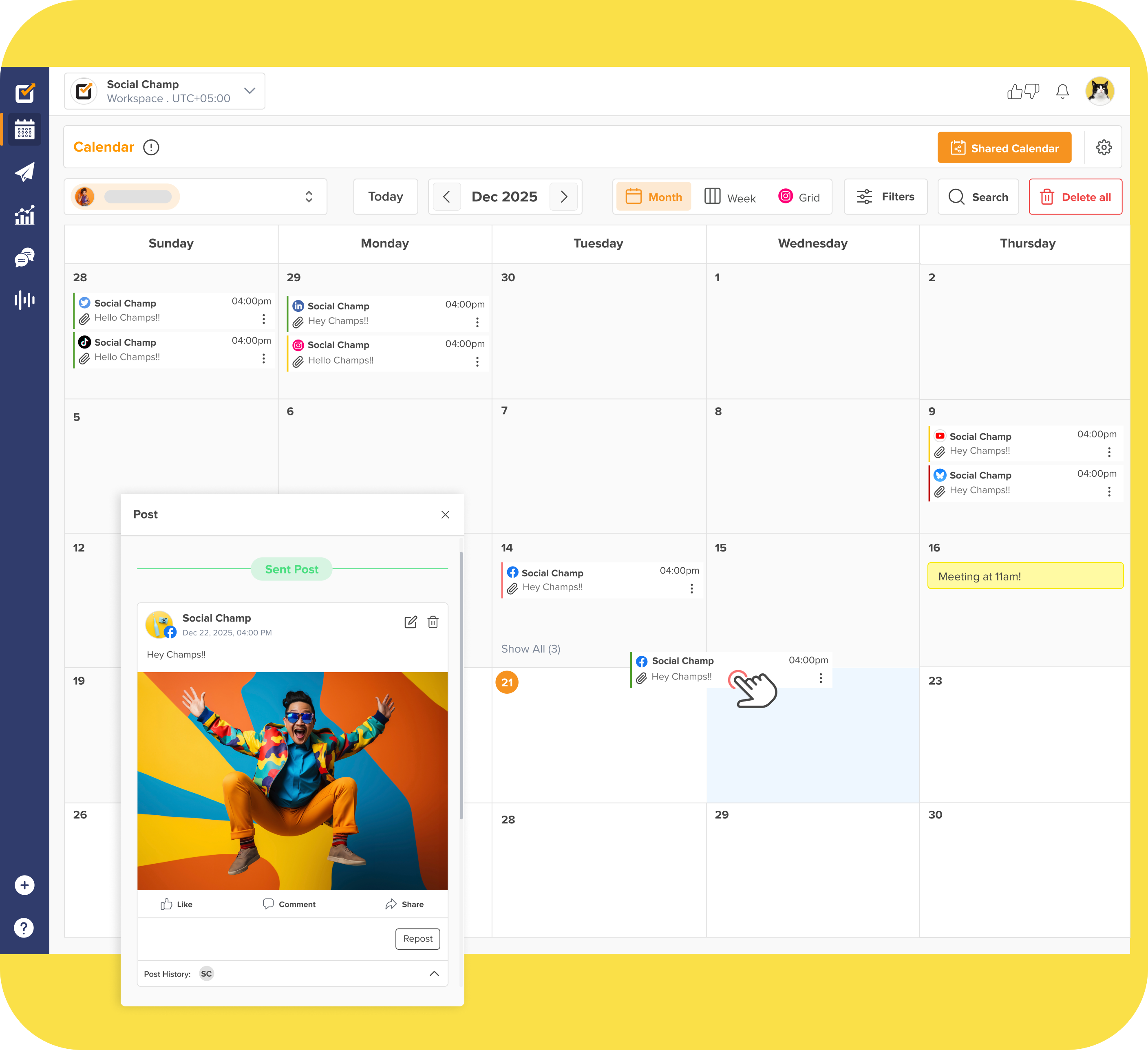
Automate Your Retail Marketing Today!
Schedule posts, track performance, and stay ahead with Social Champ. Sign up for free!
Short Summary
- Retail marketing automation is transforming the industry by streamlining operations, enhancing customer engagement, and driving sales growth.
- Key benefits include improved efficiency, personalized marketing, real-time insights, and cost reduction.
- Top automation strategies include AI-driven content generation, automated email and SMS campaigns, predictive analytics, and social media automation with tools like Social Champ.
- Challenges in implementing automation include integration issues, high costs, and data privacy concerns, but choosing the right tools and strategies can overcome these hurdles.
- Selecting the right automation platform requires evaluating scalability, integrations, ease of use, and data security to ensure seamless adoption.
Understanding Retail Marketing Automation
Marketing automation in retail refers to using software and technology to streamline, execute, and track marketing tasks with minimal human effort.
It allows businesses to automate repetitive processes like email marketing, social media scheduling, customer segmentation, and performance tracking, ensuring a more efficient and data-driven approach.
Retail marketing automation applies these principles specifically to the retail industry.
It helps retailers personalize customer interactions, optimize promotions, and manage campaigns seamlessly across multiple channels.
From sending abandoned cart reminders to running targeted social media ads, automation ensures a smoother shopping experience while boosting conversions.
Featured Article: Social Media for Contractors 2025: A Complete Guide
Key Benefits of Retail Marketing Automation
Running a retail business isn’t easy. You juggle inventory, manage promotions, and constantly try to bring in new customers—all while keeping current ones engaged.
Keeping up with marketing on top of everything else can feel overwhelming.
Manually posting on social media, sending promotional emails, and tracking campaign performance take up hours that could be spent growing your business.
That’s where retail marketing automation changes the game. Instead of handling everything yourself, automation tools do the heavy lifting—saving time, reducing errors, and ensuring a seamless shopping experience for your customers.
Here’s how automation helps you run your retail business more efficiently and drive sales:
-
Save Time on Repetitive Marketing Tasks
Manually scheduling posts, sending promotional emails, and tracking customer engagement is time-consuming.
With automation, you can schedule everything in advance, letting your campaigns run on autopilot while you focus on scaling your business.
-
Improve Customer Personalization
Customers expect brands to remember their preferences.
Automation tools analyze past purchases and browsing habits to send personalized product recommendations, discounts, and reminders—helping you build loyalty without extra effort.
-
Boost Sales With Abandoned Cart Recovery
Shoppers abandon carts all the time, but automation helps bring them back.
Automated emails and retargeting ads remind customers of their pending purchases, increasing the chances of completing the sale.
-
Enhance Social Media Consistency
Retailers who post regularly see higher engagement, but keeping up can be exhausting.
Social Champ lets you schedule posts, track engagement, and maintain a consistent presence across all platforms without daily manual effort.
-
Optimize Promotions With Data-Driven Insights
Running discounts and special offers without insights can hurt profits.
Automation tools analyze customer data to determine the best time, audience, and discount percentage—ensuring maximum ROI for every promotion.
-
Increase Customer Retention With Automated Follow-Ups
Happy customers come back.
Automated thank-you emails, loyalty program updates, and exclusive offers keep your customers engaged long after their first purchase, helping you build long-term relationships.
-
Streamline Email & SMS Marketing
Sending bulk emails manually can lead to inconsistencies and missed opportunities.
Automation ensures your newsletters, promotional messages, and transactional emails are sent on time, keeping your customers informed and engaged.
-
Reduce Marketing Costs
Hiring a full marketing team isn’t feasible for every retail business.
Retail marketing campaign automation eliminates the need for extra manpower by handling repetitive tasks, allowing you to allocate your budget more efficiently.
-
Improve Inventory Management
Automation tools can track stock levels and automatically trigger retail marketing campaigns when certain products are running low or need a sales push—ensuring your promotions align with inventory levels.
-
Gain Real-Time Performance Insights
Guesswork doesn’t work in retail. While you are guessing what works best, your competitor will capture your customers.
However, with automation, you get real-time data on what’s working and what’s not.
Whether it’s email open rates, ad conversions, or social media engagement, you can adjust strategies instantly for better results.
Featured Article: 7 Key Social Media Listening Metrics Every Marketer Needs to Know in 2025
Top 10 Retail Marketing Automation Strategies for 2025
Take a look at our ten key marketing automation in retail strategies that will help you boost sales and improve customer relationships in 2025.
-
Leverage Generative AI
Generative AI is revolutionizing retail marketing by automating content creation, generating ad copy, and personalizing customer interactions at scale.
It can help you craft engaging product descriptions, create targeted email campaigns, and even suggest social media captions based on audience behavior.
With generative AI-driven tools, you can ensure your marketing remains fresh, relevant, and optimized for conversion.
Tools like ChatGPT and Jasper AI can generate product descriptions, email subject lines, and blog content in seconds.
These tools save time and resources while maintaining a consistent brand voice across all platforms.
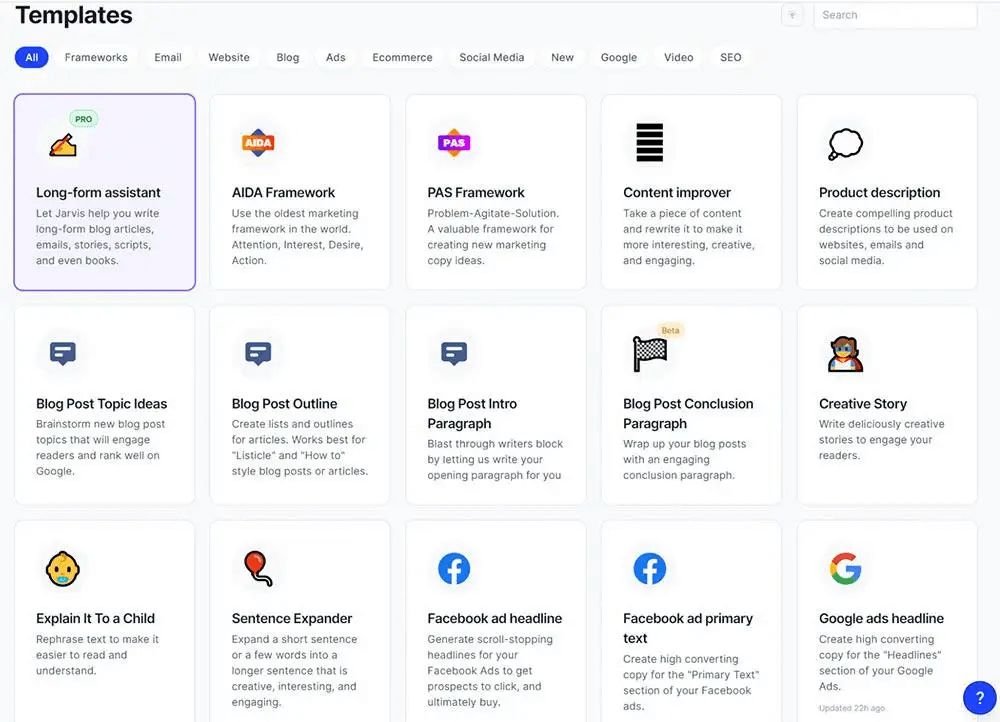
Jasper AI Templates’ Dashboard -
Introduce Automated Email Campaigns to Your Marketing Plans
Email marketing remains one of the most effective ways to nurture leads, retain customers, and drive sales.
Automating your email campaigns allows you to send personalized product recommendations, abandoned cart reminders, and exclusive offers without human effort.
This ensures your customers receive timely and relevant communication that boosts engagement.
Platforms like Omnisend and Mailchimp allow you to create behavior-based email sequences that automatically trigger based on customer actions, such as purchases or website visits.
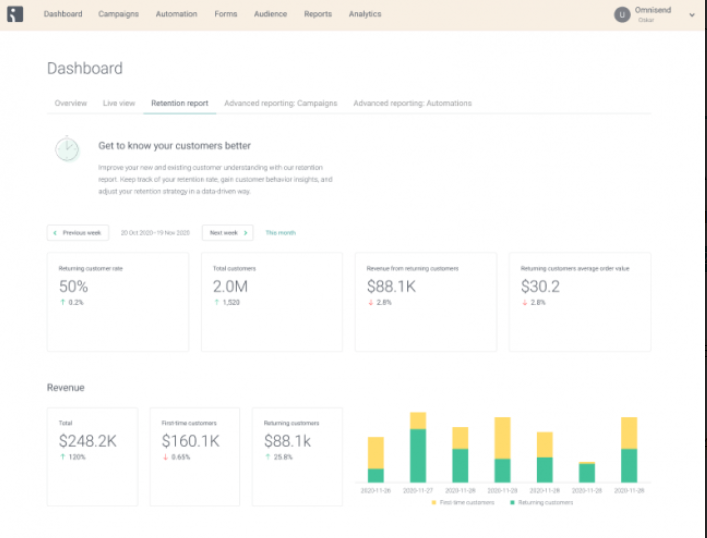
Omnisend’s Dashboard -
Increase Brand Awareness Through Automated SMS
Text message marketing is a powerful way to reach customers instantly.
Automated SMS campaigns help you send promotions, reminders, and personalized messages to keep your audience engaged.
Since text messages have a 98% open rate, this strategy can significantly increase customer interactions.
Twilio and Klaviyo allow retailers to schedule automated SMS campaigns that notify customers about sales, new arrivals, and special discounts—keeping your brand top-of-mind.
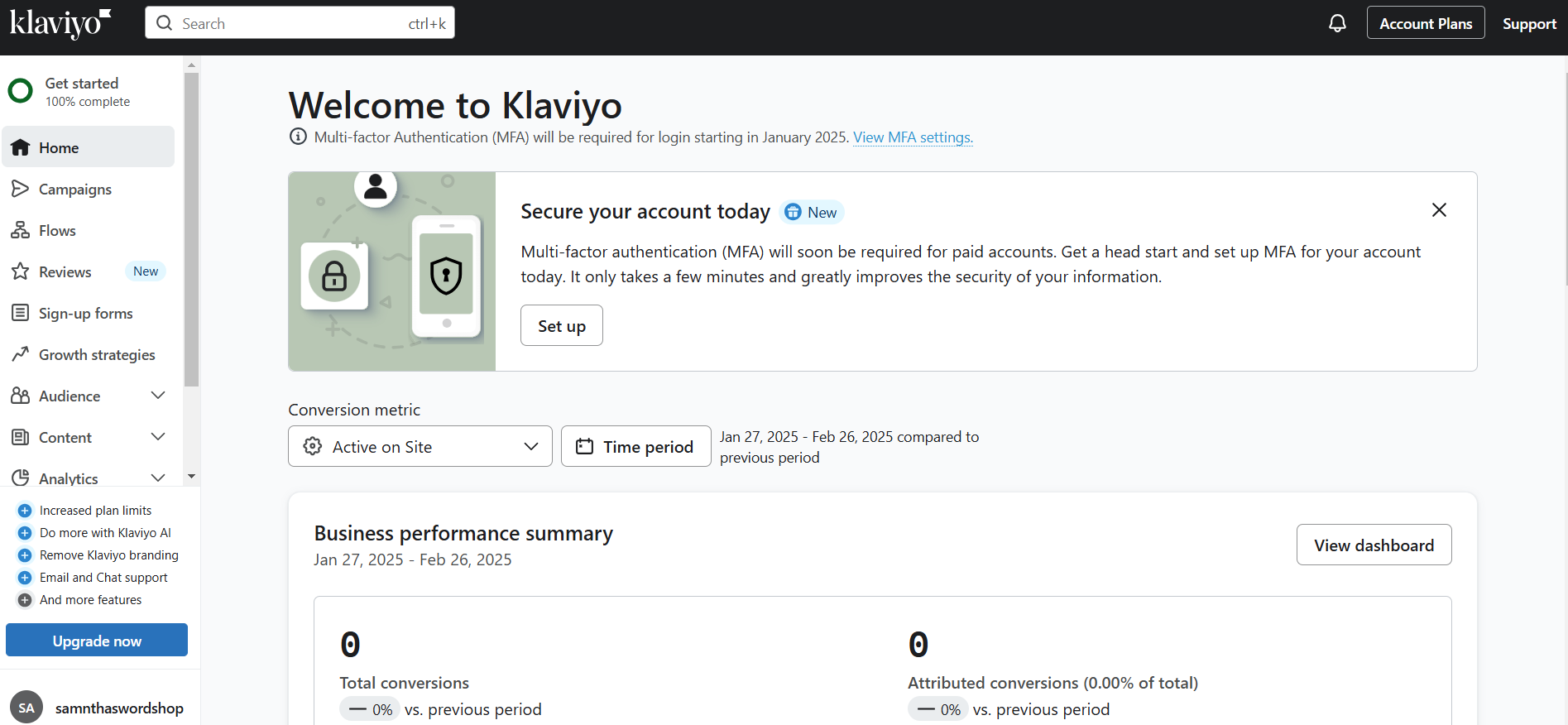
Klaviyo’s Dashboard -
Streamline Social Media Marketing
Managing multiple social media platforms can be overwhelming.
Automating your social media scheduling, analytics, and engagement helps you maintain a consistent online presence without the hassle of manual posting.
With retail social media automation, you can plan campaigns in advance, analyze performance, and optimize your content strategy for better results.
Social Champ enables you to schedule posts across multiple platforms, analyze engagement, and automate responses, ensuring your retail brand stays active without constant supervision.
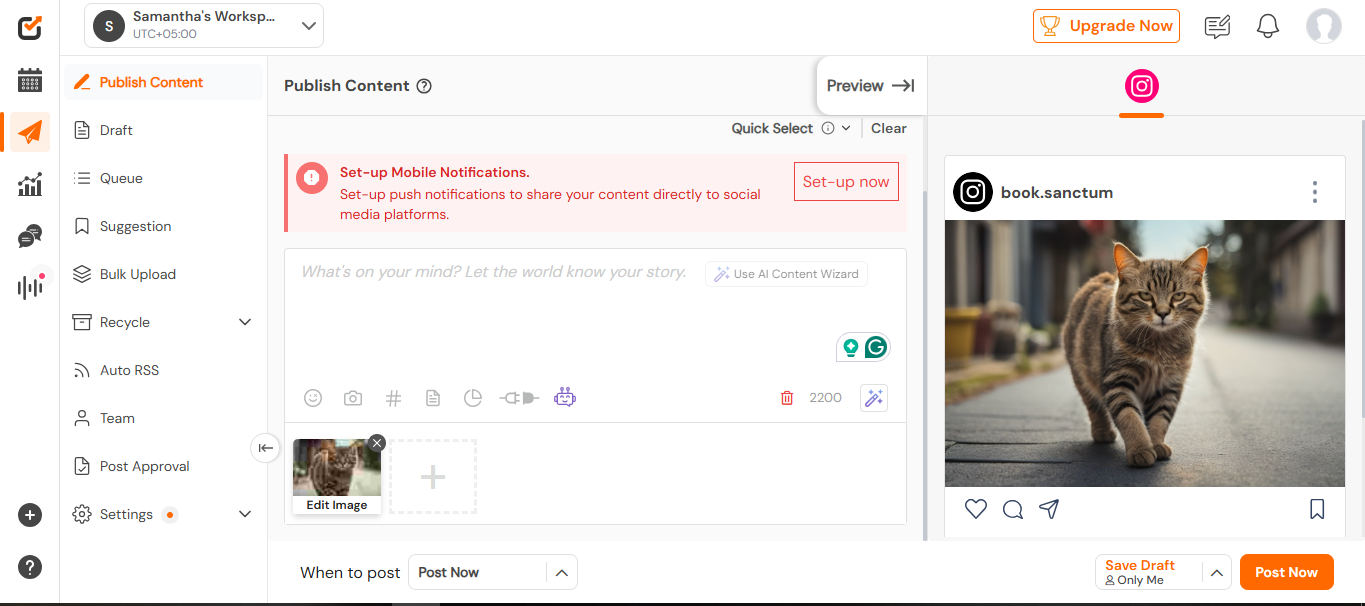
Social Champ’s Dashboard

Retailers Are Winning with Social Champ—Are You?
Social Champ lets you schedule posts, engage with customers instantly, and track performance effortlessly—all from one powerful platform.
-
Personalized Product Recommendations
Customers expect a tailored shopping experience, and automated product recommendations help boost sales by showing shoppers items relevant to their interests.
AI-driven recommendation engines analyze past behavior to suggest products, increasing the likelihood of conversion.
Amazon’s recommendation engine is a prime example of how AI can drive more sales by suggesting items based on browsing and purchase history.
Retailers can use tools like Nosto or Dynamic Yield to implement similar AI-powered recommendations.
-
Enhance Customer Engagement With Conversational AI
AI-powered chatbots and virtual assistants improve customer service by providing instant responses, answering FAQs, and assisting in product selection.
They can handle multiple inquiries at once, ensuring customers get the help they need without long wait times.
Drift and Tidio offer AI chatbots that help retailers automate customer support, increase engagement, and improve shopping experiences—all while reducing operational costs.
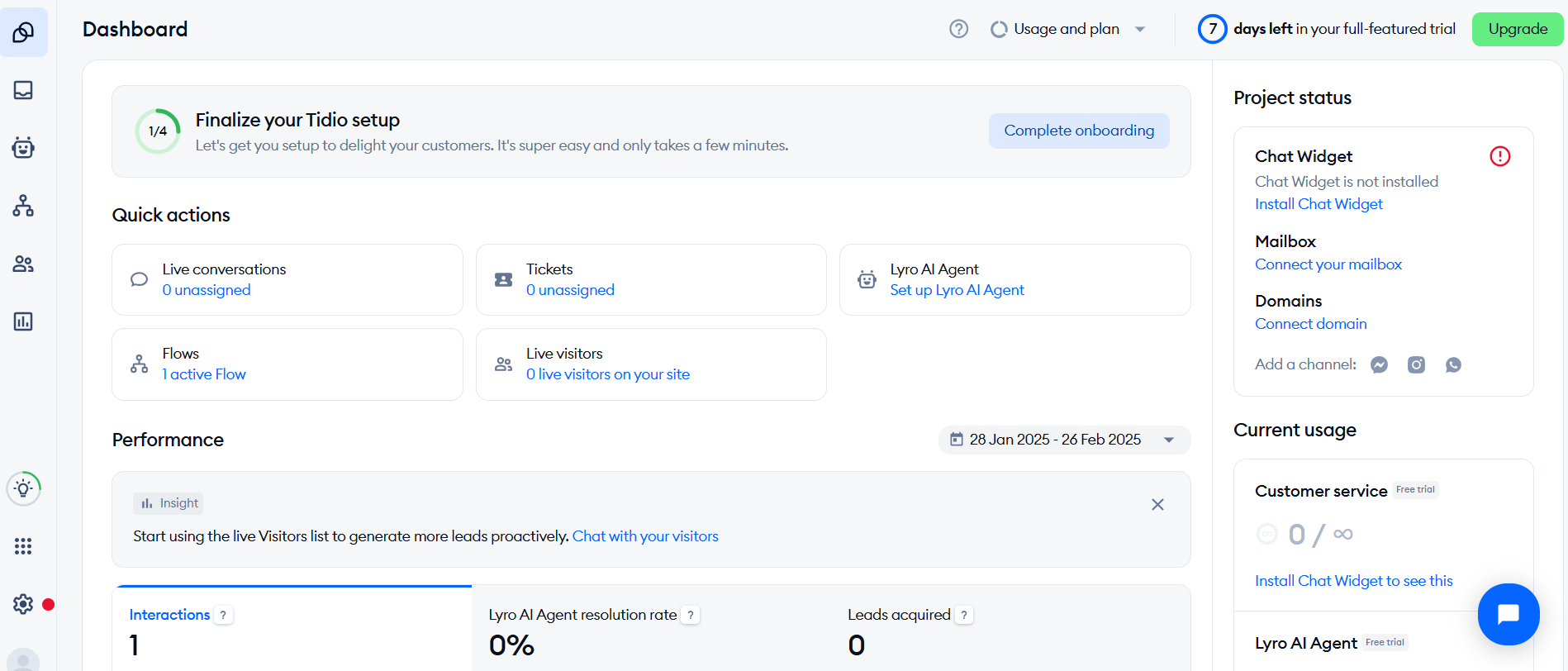
Tidio’s Dashboard -
Optimize Your Marketing Campaign With Predictive AI
Predictive AI helps you analyze customer behavior, forecast trends, and optimize marketing efforts for better ROI.
By leveraging data-driven insights, you can identify which promotions work best, when to send marketing messages, and what products are likely to perform well.
ActiveCampgains’ predictive sending feature is a prime example of it.
Using machine learning, this AI-powered tool sends emails to your customers when they are most likely to open them.
It predicts the perfect time by analyzing your customer’s past interactions with you.
Even if it is a new customer, it makes its predictions by analyzing behaviors of similar audience interactions.
-
Track Analytics and Important Retail Marketing
Tracking key performance indicators (KPIs) is essential for measuring the success of your marketing efforts.
Automated analytics tools help monitor metrics like customer acquisition cost (CAC), conversion rate, customer lifetime value (CLV), and return on investment (ROI)—allowing you to make data-backed decisions.
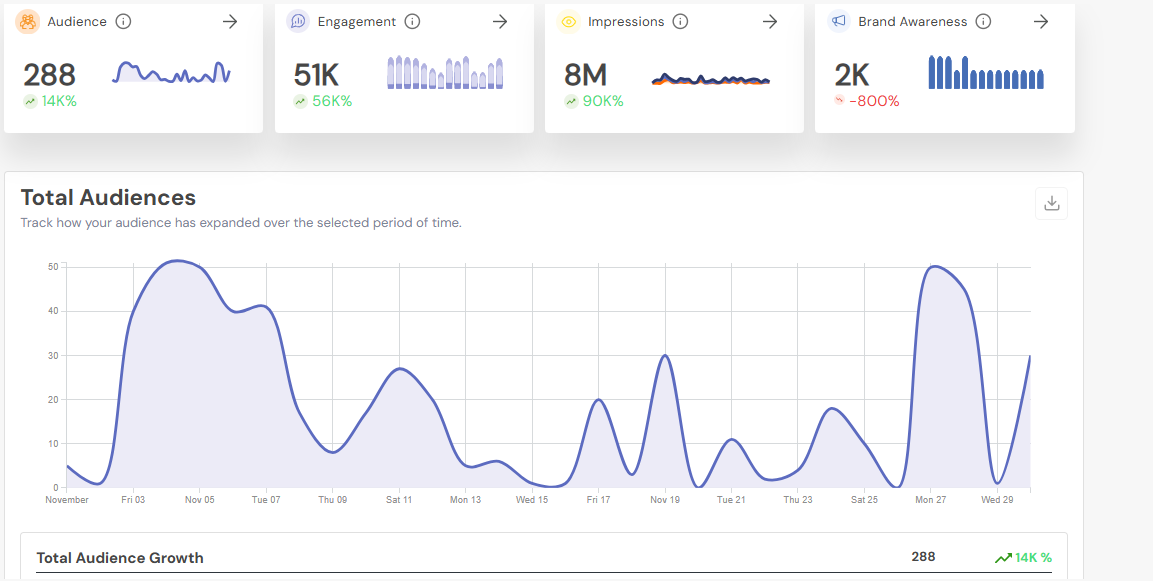
Social Champ’s Analytics Feature Social Champ’s analytics dashboard provides in-depth performance insights, helping retailers track engagement, identify top-performing content, and refine their social media strategy for better results.
-
Employ AI-powered Data Cleanup for Spot-on Marketing Strategy
Retailers collect massive amounts of customer data, but inaccurate or outdated information can lead to poor marketing decisions.
Although comparatively a new advancement in the automation industry, data cleanup automation tools help clean, organize, and update data, ensuring you reach the right audience with precise targeting and personalization.
For example, Google BigQuery Data Clean Room helps retailers clean, organize, and analyze large datasets securely, ensuring accurate and privacy-complaint customer insights for more effective retail marketing campaign automation.
-
Utilize Workflow Automation
Manual tasks slow down marketing efficiency.
Workflow automation tools streamline repetitive processes like order processing, inventory updates, and marketing campaign execution—freeing up time for strategic planning and customer engagement.
Zapier and Make connect different apps and automate tasks, reducing human errors and improving efficiency across retail operations.
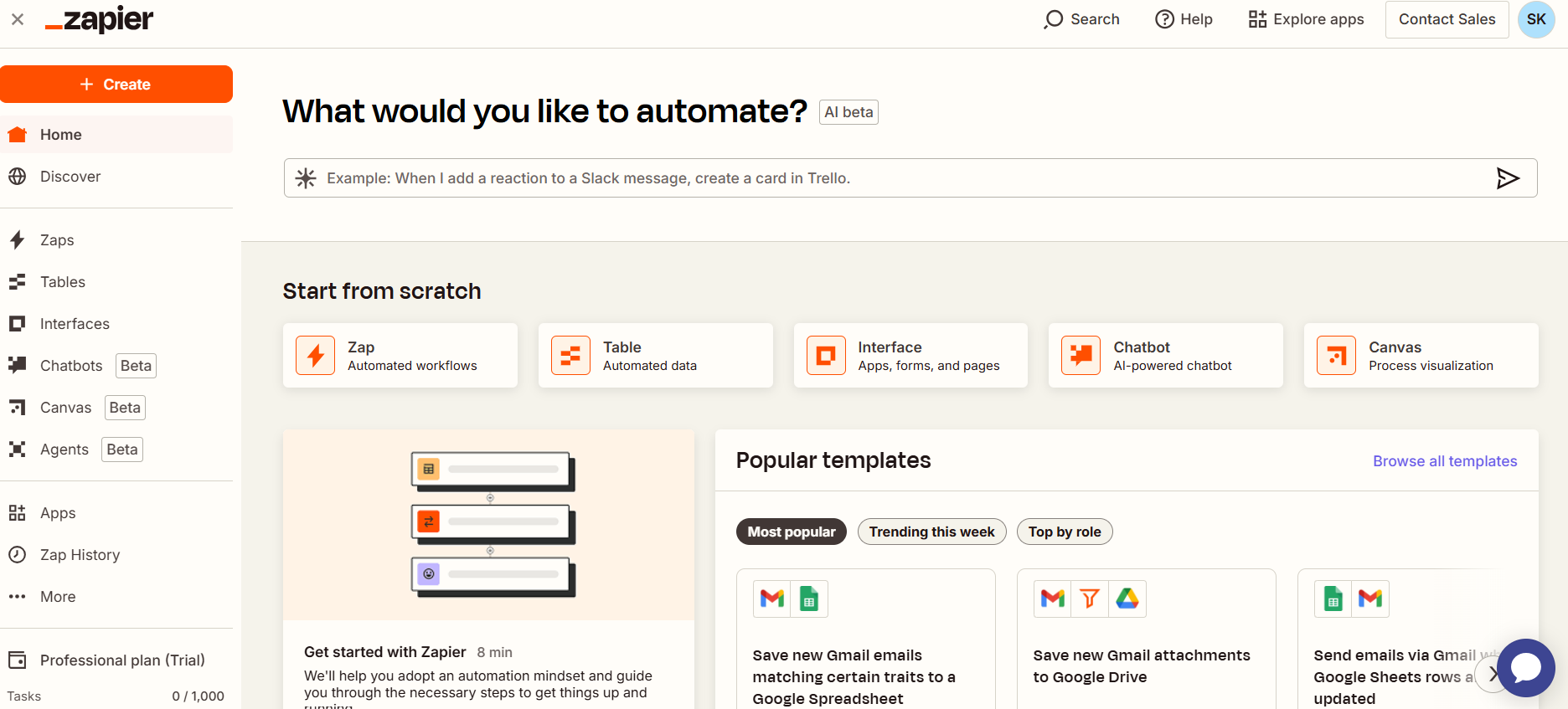
Zapier’s Dashboard
How to Choose the Right Automation Platform for Your Retail Marketing Needs
- Assess Your Needs & Goals– Identify the specific challenges you want to solve, whether it’s customer engagement, social media scheduling, or email marketing automation.
- Ensure Seamless Integration – Choose a platform that integrates with your existing CRM, eCommerce system, and other essential tools to avoid data silos.
- Prioritize Scalability – Opt for a solution that grows with your business, offering advanced automation features as your needs evolve.
- Focus on User-Friendliness – A complex platform can slow down adoption. Look for an intuitive interface that your team can easily navigate.
- Verify Data Security & Compliance – Ensure the platform complies with data protection regulations (such as GDPR or CCPA) to safeguard customer information.
- Look for Built-in Analytics – Tracking campaign performance is crucial. Choose a platform with detailed reporting features to measure ROI effectively.
Featured Article: Ultimate Guide to Social Media for Doctors in 2025
Automate Your Social Media Retail Marketing With Social Champ!
Running a retail business is already a full-time job—adding social media management to the mix can make your schedule even more packed.
But in today’s digital world, a strong social media presence is non-negotiable.
You need to keep your audience engaged, promote your products, and stay ahead of trends—all while managing your store.
Social Champ lets you plan your posts weeks in advance, reuse top-performing content, and use AI-powered captions to make your messaging more engaging.
Plus, with built-in analytics, you can track your performance and adjust your strategy for better results.
Features like bulk scheduling and auto-RSS posting help you maintain a steady content flow without constant manual overworking.

All-In-One Social Media Solution for Your Retail Business
Manage multiple platforms, schedule posts, and engage with customers—all from a single dashboard.
Conclusion
Retail marketing automation is no longer just an advantage—it’s a necessity for staying ahead in 2025.
From AI-driven personalization to automated social media management, leveraging the right tools can help you streamline operations, boost sales, and enhance customer experiences.
While challenges like integration and cost exist, choosing the right platform makes all the difference.
With solutions like Social Champ, you can automate your retail marketing efforts effortlessly and focus on growing your business.
Now’s the time to embrace automation and set your retail brand up for long-term success!
